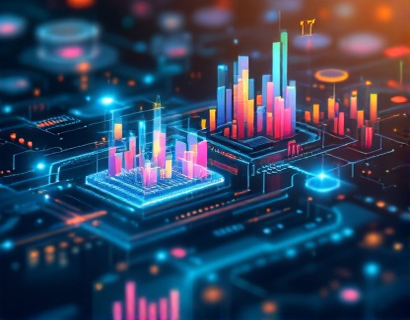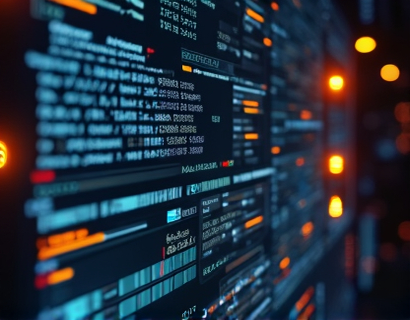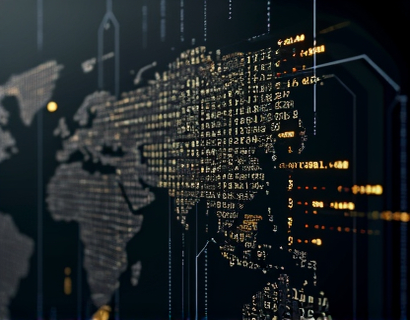The Convergence of AI and Crypto: Pioneering Financial Innovation for the Digital Age
The intersection of artificial intelligence and cryptocurrency is giving birth to a new era of financial innovation. This convergence is not just a technological curiosity but a transformative force reshaping the landscape of digital finance. As we delve into this topic, we explore how these advanced technologies are redefining traditional financial services and unlocking unprecedented opportunities in the digital world.
The integration of AI into the crypto ecosystem is multifaceted, impacting various aspects from trading and security to user experience and regulatory compliance. This article aims to provide a comprehensive overview of the current state and future potential of AI-driven crypto solutions, catering to tech enthusiasts and innovators who are keen to understand the implications of this merging frontier.
Enhancing Trading Efficiency
One of the most immediate and visible impacts of AI in crypto is in the realm of trading. AI algorithms can analyze vast amounts of market data in real-time, identifying patterns and trends that human traders might miss. This capability leads to more informed decision-making and improved trading strategies. Automated trading bots powered by AI can execute trades at optimal times, minimizing emotional biases and maximizing efficiency.
Moreover, AI-driven platforms can offer predictive analytics, forecasting market movements based on historical data and current events. These predictions are not only useful for individual traders but also for institutional investors looking to make strategic moves in the crypto market. The ability to anticipate market fluctuations can significantly enhance portfolio management and risk assessment.
Security and Fraud Detection
Security has always been a critical concern in the crypto space, and AI is playing a pivotal role in addressing these challenges. Machine learning algorithms can detect unusual patterns and anomalies in transaction data, flagging potential fraudulent activities with high accuracy. This proactive approach to security helps protect users' assets and maintains the integrity of the crypto ecosystem.
AI-powered security solutions can also enhance the authentication process, using biometric data and behavioral analysis to verify user identities. This multi-layered security framework not only deters cyber threats but also builds trust among users, encouraging broader adoption of crypto technologies.
User Experience and Accessibility
The complexity of crypto can be daunting for newcomers, but AI is making significant strides in simplifying the user experience. Chatbots and virtual assistants powered by natural language processing (NLP) can guide users through the crypto landscape, answering queries and providing personalized recommendations. These AI-driven interfaces make the crypto space more accessible, reducing the learning curve for beginners and enhancing the overall user experience.
Furthermore, AI can optimize wallet management, automatically suggesting the best storage solutions based on user preferences and security needs. This level of personalization ensures that users can focus on their financial goals without being overwhelmed by technical details.
Regulatory Compliance and Reporting
The regulatory environment for crypto is evolving rapidly, and compliance is a significant challenge for businesses operating in this space. AI can streamline regulatory reporting and compliance processes by automating the collection and analysis of data. This automation ensures that all necessary reports are generated accurately and on time, reducing the risk of penalties and legal issues.
AI-driven compliance tools can also monitor changes in regulations across different jurisdictions, alerting businesses to necessary adjustments in their operations. This proactive approach to compliance helps crypto companies navigate the complex regulatory landscape more effectively, fostering a more stable and trustworthy market.
Innovative Financial Products and Services
The synergy between AI and crypto is giving rise to a new generation of financial products and services. Decentralized finance (DeFi) platforms, for instance, are leveraging AI to create more sophisticated and user-friendly financial instruments. AI-powered lending and borrowing platforms can assess creditworthiness more accurately, extending financial opportunities to a broader audience.
Stablecoins, which aim to maintain a stable value, can benefit from AI algorithms that adjust supply and demand dynamically. This adaptive mechanism helps stabilize prices, making stablecoins a more reliable store of value and medium of exchange. Additionally, AI can enhance yield farming strategies, optimizing returns for users by identifying the most profitable opportunities in the DeFi space.
Smart Contracts and Automated Executions
Smart contracts, self-executing contracts with the terms directly written into code, are a cornerstone of blockchain technology. AI can further enhance the capabilities of smart contracts by adding layers of intelligence and adaptability. For example, AI can analyze external data sources and automatically trigger contract executions based on predefined conditions, ensuring that agreements are fulfilled precisely as intended.
This level of automation not only increases efficiency but also reduces the need for intermediaries, lowering transaction costs and speeding up processes. The combination of smart contracts and AI paves the way for more complex and sophisticated financial arrangements, opening new possibilities for businesses and individuals alike.
Challenges and Considerations
While the potential of AI in the crypto space is immense, there are several challenges and considerations that must be addressed. One of the primary concerns is the ethical use of AI, ensuring that algorithms are transparent and free from bias. The crypto community must prioritize ethical standards to maintain trust and foster widespread adoption.
Another challenge is the regulatory landscape, which varies significantly across different regions. AI-driven crypto solutions must comply with local laws and regulations, which can be a complex and evolving process. Collaboration between tech developers, regulators, and industry stakeholders is essential to create a balanced and supportive regulatory environment.
Technical challenges, such as scalability and interoperability, also need to be overcome. As the number of AI-powered crypto applications grows, ensuring that these systems can scale efficiently and work seamlessly together is crucial for the long-term success of the ecosystem.
The Future of AI and Crypto
Looking ahead, the integration of AI and crypto is poised to revolutionize the financial industry in ways we are only beginning to imagine. As technology continues to advance, we can expect even more sophisticated AI-driven solutions that enhance the functionality and accessibility of crypto platforms.
One exciting area of development is the use of AI in creating more resilient and decentralized networks. AI can optimize the distribution of computing resources across a blockchain, improving network performance and security. This optimization can lead to faster transaction times and lower fees, making crypto more appealing to a wider audience.
Moreover, the convergence of AI and crypto is likely to spur innovation in other sectors, such as supply chain management, healthcare, and finance. The principles and technologies developed for the crypto space can be adapted and applied to various industries, driving broader digital transformation.
In conclusion, the fusion of AI and crypto represents a significant leap forward in financial innovation. By enhancing trading efficiency, bolstering security, improving user experience, streamlining compliance, and creating new financial products, this synergy is reshaping the digital finance landscape. As we continue to explore and develop these technologies, the potential for transformative change remains vast, offering exciting opportunities for tech enthusiasts and innovators alike.










































